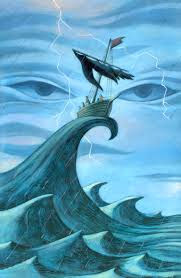Call Me Ishmael, but can I Believe You?
- The Tempest
- Mar 24, 2016
- 3 min read

I have often heard people ramble on with musings about Ishmael and his amicable and endearing storytelling as the narrator inMoby Dick. Ishmael is our source of narrative, reason, and sentiment as we travel along with the crew of the schooner as they leave New Bedford for Nantucket. However, after reading the first section of Moby Dick, the argument could be made that he is not the most practical and logical of narrators, and it calls into question just how reliable of a story teller he really is.
In chapter two, Ishmael arrives in New Bedford, with seemingly not a single plan on what to do. He seems to have an ill-conceived notion of sailing on a Nantucket ship from New Bedford "because there was a fine, boisterous something about everything connected with that famous old island, which amazingly pleased me" (Melville 9). To go off sailing on a recreational cruise might be one thing, but to want to sail on a whaling ship arguably takes considerable more physiological and emotional investment that just doesn't seem to be present in Ishmael at the beginning of the story. His lack of preparation and planning as he aimlessly wanders around in the opening chapters of the novel demonstrate a lack of preparation and planning which is not a good affective state for a sailorThis lack of "sailor" in him is reinforced in chapter three as he enters the Spouter Inn. Ishmael describes the walls as a "heathenish array of monstrous clubs and spears" (Melville 14). If it was Melville's intent to show the horrors of whaling--which another classmate's post alluded to this week--the argument that I put to Ishmael and other ecological interpretations of the whaling industry is "what did you expect?" Ishmael goes on to explain that "you shuddered as you gazed" (Melville 14) at the sight of the clubs, spears, whale teeth, etc. Does this sound like a narrator who can accurately reflect on what is really happening around him and, more importantly, can he be trusted by his crew mates on a whaling ship? Probably not.
Later, Ishmael describes his reservations about having to bed with this "harpooner" that the proprietor says will be in later that night. Although Ishmael might be curious of the man who he is sharing a room with, his conjectures seem to demonstrate a fear and weakness that one would not find in a sailor. He carries on for several paragraphs in chapter three about how this harpooner and his "linen would not be of the tidiest certainly none of the finest" (Melville 18). Here we find Ishmael worrying about the type of clothing that a whaler will have in the room with him and Ishmael also seems a bit concerned about the quality of it. How reliable of a whaler can Ishmael be as he blathers on about petulant trivialities like this?
In an ironic twist, in chapter six we find Ishmael in the streets of New Bedford as he observes men from out of town coming in to town to find work on the boats. Ishmael mocks these men, calling one (in his thoughts) a "bumpkin dandy...and the comical things he does" (Melville 37). Furthermore, Ishmael's sailing inexperience is blatantly displayed in his meeting with Captain Peleg in chapter sixteen. Ishmael is inquiring about work on the boat and Peleg inquires if he "dost know nothing at all about whaling" (Melville 79)? Ishmael humbly replies that he has not. Disregarding Peleg's double negative, this admittance of Ishmael's "greenhorn" characterization gives the reader direct confirmation that he simply doesn't know what he is doing. This is completely fine, but it certainly contradicts the arrogant show of superiority exhibited by Ishmael in the previous chapter, and causes the reader to ask just how much of what Ishmael says can really be taken at face value.
Like most job seekers, one has to perform and prove him or herself to be up to he abilities that he or she aspires his or her self to be. Ishmael says he is a sailor, but he will have to prove it to me.
Melville, Herman. Moby Dick. 1851. New York: Penguin. 2003.






Comments